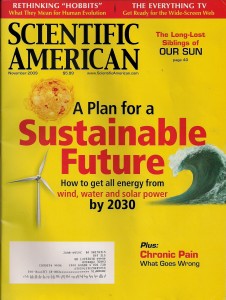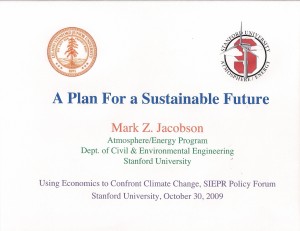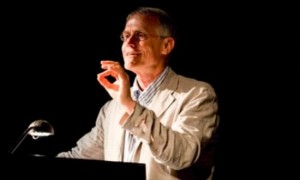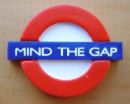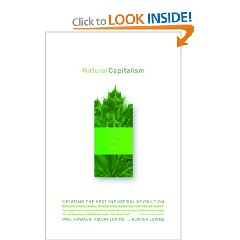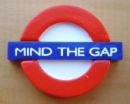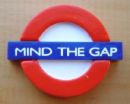Edit of 19 Jan 08 to add links.
This book is pro-business, pro-market, and pro-life. It outlines how profits can be made by going green and getting in touch with the actual cost of goods and services. It demonstrates how efficiencies can produce a 71% per year after tax Return on Investment (ROI).
On page 261, the following quote summarizes the intellectual victory that this book represents over economic fundamentalism: “That theology treats living things as dead, nature as a nuisance, several billion years' design experience as casually discard able, and the future as worthless.”
The three authors are “originals” whose genius dates back to the 1980's, and I am finding that the books written in the 1970's and 1980's were a quarter-century before their time of acceptance, and now pressing urgent and relevant.
They advocate a shift from a production economy that disregards the actual costs of goods, toward a service economy in which durability, ease of repair, and the elimination of waste transforms commerce so that we have sustainable profit, not short-term destructive profit.
The basic premise of the book is that in the next 100 years the population will double while available natural resources will drop by one half to three quarters.
The authors are damningly trenchant when they point out that we have taken just 300 years to consume 3.8 billion years of natural capital by turning scarce resources into permanent waste.
I am at one with these authors when they suggest that labor is now abundant–I for one believe that national leaders must demand full employment and cease substituting technology, which requires natural capital, for human capital. We need to reverse the process and restore full employment, community-based resource allocation.
In the course of two days with this book, I pulled 21 key ideas that I list here in tribute to these authors and their work:
1) Cars can generate electricity during the 90% of the time they are parked, and this will allow the replacement of ALL coal and nuclear plants
2) We waste 1 million pounds per person per year in the USA
3) Authors are saving business, not fighting business
4) Two trillion out of nine trillion in the total economy per year is waste of no value, including time spent in automobile gridlock
5) Real-time feedback is the number one resource saver
6) Biological processes create Kevlar strength silk (spiders) and walls (oysters)–we should emulate them instead of continuing our toxic ways.
7) Green buildings increase human productivity while reducing waste
8) Continuous education of designers and engineers is the single best investment for continually updating our ability to eliminate waste
9) Point to point air travel in smaller more numerous aircraft is a much more efficient alterative to the hub systems
10) We must end our perverse subsidies of wasteful agricultural, energy, forestry, fishery and other harmful practices by publicizing the foolish budget allocations
11) We should tax pollution and waste rather than income
12) Agricultural residues can be used to make paper, which can be recycled and substituted (e.g. electronic). We must end junk mail and unneeded packaging that outlasts its contents.
13) Restore localized agriculture, deep sustainable farming that does not deplete topsoil, get smart on water and fuel consumption.
14) Get a national water policy and water education, recover all rain (which can meet all of Africa's needs), use gray water; get a grip on toilets to include separate capture of urine and feces.
15) Protect the climate
16) Conserving energy is cheaper, faster, better than trying to produce more
17) Canceling or updating antiquated laws long overdue (for example, giving away billions of gold based on 1800 laws, for pennies)
18) Adjust prices to reflect external costs
19) Implement no fault insurance purchased at the pump
20) Create information feedback loops at all levels
21) Need systemic approach (what I call the ten threats, twelve policies, eight challengers) to avoid unintended spill-over consequences
22) The market cannot do it all. We need government.
Above all intelligence and information can make this happen. Simply labeling switches allows localized awareness and individual actions to save energy. The lack of accurate and up to date information is the largest correctible deficiency
I put this book down hoping that I might one day be able to take the secret intelligence budget of $60 billion a year, cut it by two thirds, and apply one third of that budget to implementing this book's ideas, and one third to creating a new form of global education that is continuous, free, online, in every language, and equally balanced between structured human teaching, interactive social networking, and self-paced online learning through serious games.
There is plenty of money and plenty of brainpower to save our planet and our quality of life while elevating the five billion poor, what we lack is inspired political transpartisan leadership, and a model, perhaps a model to be created in British Columbia, Washington, and Oregon.
I want to be part of this “big push” and am in awe of these authors and the big ideas they represent.
My top ten green to gold books:
The Limits to Growth
Seven Tomorrows
Silent Spring
Ecological Economics: Principles And Applications
High Noon 20 Global Problems, 20 Years to Solve Them
The Future of Life
Plan B 3.0: Mobilizing to Save Civilization, Third Edition
Green to Gold: How Smart Companies Use Environmental Strategy to Innovate, Create Value, and Build Competitive Advantage
Cradle to Cradle: Remaking the Way We Make Things
I would also point with enormous respect to books on green chemistry, beneficial bacteria, sustainable design, and what I think of as the “home rule” literature: an end to corporate personality, localized agriculture, localized credit (e.g. Interra Project), and an end to absentee landlords and mega farms that produce indigestible corn for cattle whose waste gets into our spinach, and for fuel (one tank of ethanol consumes enough corn to feed an individual for an entire year).
